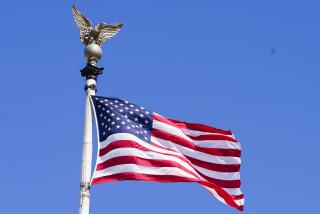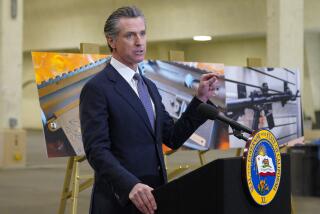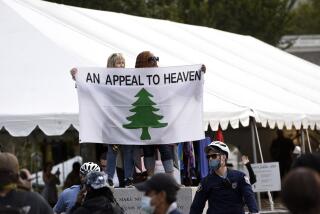Cross on Public Land Ruled Constitutional
- Share via
SAN FRANCISCO — In a sharp departure from other court rulings, a federal judge on Thursday upheld the constitutionality of a 103-foot cross on city land, finding that it did not represent official endorsement of Christianity.
The decision marked the first time in 10 cases that a federal court has approved a government-sponsored display of the cross, attorneys said.
U.S. District Judge John P. Vukasin Jr. found that the 58-year-old structure--the largest free-standing cross in the nation--had become a secular local landmark and did not violate the separation of church and state.
Vukasin said he found a legal challenge to the cross ironic in San Francisco, a city that seemed to tolerate “almost any kind of conduct.”
The concrete-and-steel structure is on a peak in Mt. Davidson Park and can be seen for miles. The cross, the site of Easter sunrise services for years, was dedicated in 1934 when President Franklin D. Roosevelt pressed a telegraph key at the White House to illuminate the structure.
Thomas Steel, an attorney for a group of religious leaders and civil libertarians who brought suit contesting municipal ownership and maintenance of the cross as improper government endorsement of religion, said Vukasin’s ruling would be appealed to the U.S. 9th Circuit Court of Appeals.
“This is the first court in history to uphold the display of a solitary cross on government land,” said Steel. “We expect the appeal court to follow other rulings and hold (that) the government cannot display a symbol of one particular religion on government land--particularly one so powerful as the symbol of Christianity.”
Deputy City Atty. Arthur Greenberg said he was confident Vukasin’s ruling would be upheld on appeal.
The judge, explaining his decision from the bench, cited a 1989 ruling by the U.S. Supreme Court approving the display of a menorah, a symbol of Judaism, along with a Christmas tree at a government building. In that case, the high court said that such displays must be judged in full context and implied that lower courts could have more leeway to uphold their validity.
Vukasin noted that the San Francisco cross was in a relatively secluded, wooded environment, far away from City Hall. Maintaining the cross in such a location could not be seen as approval of one religion over another, he said.
More to Read
Sign up for Essential California
The most important California stories and recommendations in your inbox every morning.
You may occasionally receive promotional content from the Los Angeles Times.













